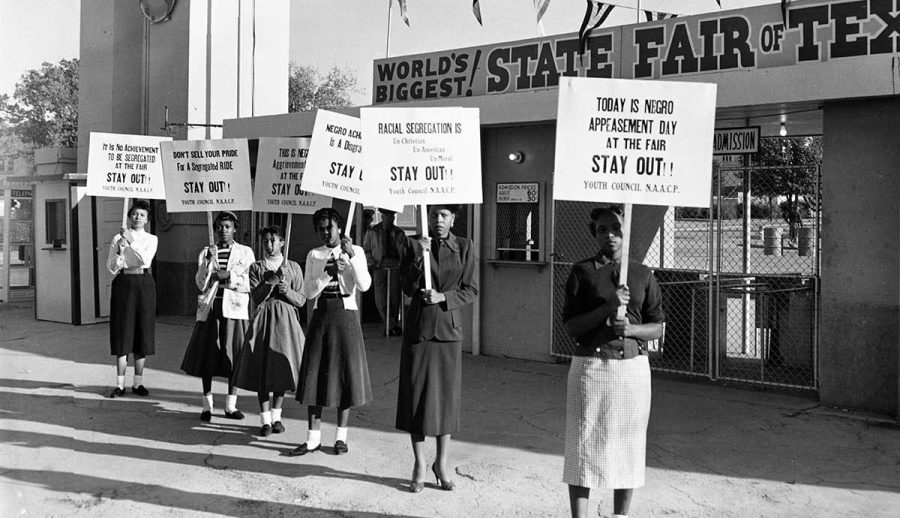Controversial book resurfaces again
NAACP members protest discrimination at the Texas State Fair in October 1955.
April 3, 2023
On July 9, 1950, the Stephenville Daily Empire Tribune published a small blurb reporting another Dallas home exploded from another bomb. This was the fourth bombing since February of that year.
The historical events leading up to this ugly truth seem to have been forgotten by some. Thanks to the curiosity and determination of a few people, the story wouldn’t remain buried.
Coined as the most dangerous book in Dallas by D Magazine, “The Accommodation: The Politics of Race in an American City” is a historical book penned by Jim Schutze. In it, Schutze shares the miraculous story of how this book made it through the toughest of times.
The 261-page book addresses how white business establishments co-opted Black leaders to prevent riots in the late ’60s. It also outlines the history of race relations between Blacks and whites and the bombings of Black communities in the 1950s.
When Robert Frese, editor for Taylor Publishing Company, proposed the book idea to Schutze, the author wasn’t sure how successful it would be. “This is a very tough topic for Dallas,” Schutze said. “I don’t know if anyone here would publish a book on it.”
He said Frese responded, “You write the book. I’ll fight off the bears.”
Schutze had some doubts, but dedicated his time to research and interviewing his sources. He spent long hours in the library. As the deadline for the book approached, Frese told Schutze he had to get it done sooner because there was a problem. Frese said he could not talk to him about it or Frese would lose his job. “Just get it done sooner or it’s not going to happen,” Frese said. He moved the deadline up by several months. Schutze met the deadline.
One Friday, three days before the book was scheduled to be printed, Frese called Schutze and told him they got the page press ready for print on Monday. During this time, in order to print customized text for books, printing plates were used. They were placed on a printing press.
“It’s way too late for them to kill it now,” Schutze recounted Frese telling him. However, on Monday morning Schutze received a phone call from a choked up Frese who said: “They’re back there ripping the page plates off the press. It’s not going to happen. They killed it.”
Schutze said, “Who killed it?” Schutze said Frese told him that if he shared who killed the book, he would be at risk of being fired. But Schutze said he knew who killed it.
So who killed the first copy of “The Accommodation”? Some say it was Taylor Publishing Company of Dallas that allegedly dropped it because of low sales, but Schutze told a different story during an event as a keynote speaker at Dallas College Cedar Valley Campus hosted by campus president Joe Seabrooks.
In the 1980s, Schutze was a young columnist for The Dallas Times Herald and also worked with the Dallas Citizens council, a private leadership group that helped run the city.
During a war of words, Schutze defended the book to then City Attorney Alex Bickley, saying “The Accommodation” was a history book and most of Schutze’s sources were from the Black community, who had not forgotten the bombings that had occurred and how the Ku Klux Klan ran the city. Schutze’s main concern was that there would be disappointment in the Black community if the book was not released. Bickley’s concern was that the book would upset the white community.
On Sept. 26, 1986 the story of getting this book published and distributed broke in a New York Times article, “Withdrawal of book roils Dallas’ racial feelings.”
In the article, Frese was quoted saying, “Jim is saying things about Dallas that aren’t all nicey-nicey, and it’s so image-conscious here, you can’t say anything negative.”
This caught the attention of the Citadel Press of New Jersey. The company printed 5,000 copies of the book and shipped them down to Dallas. Half of those copies were destroyed in a warehouse fire.
Frese said there were fears of adverse local reaction to the book, and so it went underground. There were only a few rare copies circulating. According to a D Magazine 2015 article, the book was so rare, the cheapest copy was listed on Amazon.com in late March that year for $989. Now, the book sells on Amazon for $30. Older used copies sell on sites such as Ebay and Etsy for $200-$400.
In 2013, the book started to surface in a low-resolution PDF online. Many young people were curious. They wanted to know why the city of Dallas was the way it was. “The truth will out,” Schutze said, during the CVC Black history event, quoting William Shakespeare.
To this day, there are still some who don’t want the history of Black people to be shared, Schutze said, referring to Florida Governor Ron DeSantis’s proposal for the Stop W.O.K.E. act, which would limit and prohibit how public schools and businesses discuss race and gender.
Will Evans, founder of Deep Vellum Publishing, asked Schutze to re-publish “The Accommodation” during its online resurgence in 2013.
He saw what Schutze couldn’t see in the book – its value and voice that will no longer be hidden. Evans printed over 30,000 copies, some of which went to schools.
He was also able to obtain funding from many organizations such as The Dallas Foundation, Laura and Walter Elcock, Thomas Reuters and Dallas College.



